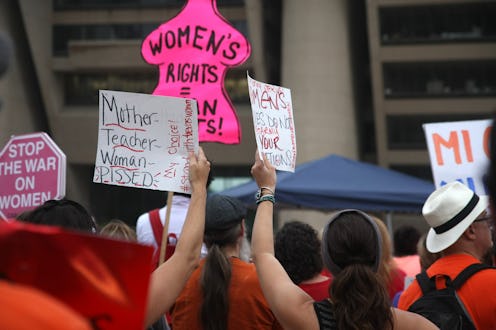
Lately, I've been writing about things women couldn't do until recently, and I've been shocked to discover how many rights have only been won five, four, or even three decades ago. Our privileges start to seem precarious when we see how recently much of our country believed we did not deserve them. Undoubtedly, many still believe we don't. So, I decided to venture into the year of my birth, 1990, to see what I can do today that I could not do when I was born. It turns out the answer is "a lot" — and some rights you might think women would have earned by 1990 have yet to be won today.
While marginalized groups in different parts of the world all have their own issues to deal with, this list focuses on the United States. A recent United Nations investigation of the country found us lagging behind the rest of the developed world in the real of women's rights, so it's worth looking at some of the specific symptoms of that delay.
To further illustrate some of the prehistoric-seeming yet surprisingly recent disadvantages women in the United States have faced, here are some things we could not do just a quarter century ago.
1. Women Could Not Successfully Sue For Workplace Discrimination Without Proof Of "Injury"
During Teresa Harris's time as a manager at Forklift Systems, Inc., its president Charles Hardy harassed her with comments like "We need a man as the rental manager" and "dumb ass woman." However, the United States District Court for the Middle District of Tennessee ruled that Harris was not "so offended that she suffered injury." After Harris appealed to the Supreme Court, it ruled in 1993 that "the District Court erred in relying on whether the conduct 'seriously affect[ed] plaintiff's psychological well being' or led her to 'suffe[r] injury,'" and that workplace discrimination was grounds for lawsuit under Title VII regardless.
2. Women Could Not Successfully Sue For Workplace Discrimination If The Accused's Threats Were Not Carried Out
Two cases in 1998, Burlington Industries, Inc. v. Ellerth and Faragher v. City of Boca Raton, established that an employee can sue an employer for workplace harassment even if they don't suffer any job-related consequences. In the case of Burlington Industries, Inc. v. Ellerth, Kimberly B. Ellerth got a promotion from the supervisor who sexually harassed her, but the court ruled that this didn't take away from the fact that she was harassed.
3. Women Could Not Marry Other Women
Same-sex marriage was not allowed in any U.S. state until 2003, when Massachusetts became the first state to legalize it. Hopefully, one day, our kids will look at us in shock when we say that marriage in this country was once only between men and women. Until then, the Supreme Court decision allowing same-sex marriage throughout the country remains in our recent memories. Women could not marry other women (and men could not marry other men) in some states at the beginning of 2015, let alone in 1990.
4. Women Could Not Be Guaranteed Maternity Leave
Until the passage of the Family and Medical Leave Act in 1993, women had no right to take time off due to the birth of a newborn, receive health insurance coverage, and return. Now, new parents are entitled to three months of leave during a child's first year, but this is unpaid. The United States remains one of only three countries to not require paid maternity leave, along with Papa New Guinea and Oman. And since there is no law requiring companies to offer paid maternity leave, most don't. According to a 2008 survey by the National Partnership for Women & Families, only 16 percent do — which just goes to show we've got a lot of work to do.
Images: Steve Rainwater/Flickr; Giphy (3)